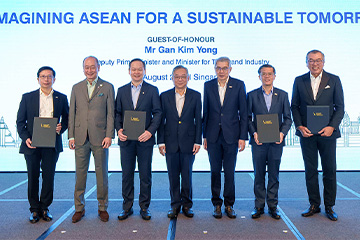The path to global growth is fraught with challenges for small and medium-sized enterprises (SMEs). Cross-border trade regulations can be complex, and many SMEs lack the resources or capacity to navigate them efficiently.
Without the right supply and distribution partners, small businesses often face high costs and logistical constraints. On top of all these, the prospect of new tariffs and sanctions are stirring up uncertainty in today’s global landscape.
Yet the UOB Business Outlook Study 2024 reveals that eight in 10 companies across ASEAN and Greater China — both small businesses and enterprises alike — are keen on expanding overseas. How can SMEs overcome these hurdles and take the leap from local to global?
One area that SMEs can take advantage of are free trade agreements (FTAs) like the Regional Comprehensive Economic Partnership (RCEP). Officially the world’s largest free trade agreement, the RCEP is designed to facilitate regional trade and investment.
How the RCEP can benefit businesses
The RCEP brings together 15 member countries: the 10 ASEAN states, along with Australia, China, Japan, South Korea, and New Zealand. The free trade agreement came into force in June 2023.
This regional partnership introduces a unified rulebook to lower barriers to trade for businesses. Covering everything from trade in services to e-commerce, the RCEP’s comprehensive measures enable SMEs to integrate into regional supply chains, gain improved market access, and conduct cross-border e-commerce seamlessly.
Leveraging the RCEP
1. Save on import and export costs with tariff concessions
High operational costs topped the list of pain points for one in three businesses last year, according to the UOB Business Outlook Study 2024. With global trade tensions driving potential new tariffs, SMEs may need to grapple with rising costs in the year ahead as well.
Through the RCEP, SMEs can achieve significant cost savings via tariff concessions. The agreement aims to eliminate tariffs on an average of 92 per cent of goods traded among member countries, either immediately or within the next 20 years.
For instance, a Singapore-based manufacturer exporting canned soup to China would typically face a 15 per cent customs duty. If the canned soup meets the RCEP’s rules of origin, it will be eligible for a preferential customs duty rate of 0 per cent – potentially saving the business thousands of dollars annually.
Businesses can use the Tariff Finder developed by Enterprise Singapore to find out what duties apply for your products.
2. Diversify your supply chain with streamlined rules of origin
Amid global uncertainties and trade disruptions, supply chain resilience has become even more critical. The same UOB report reveals that more than 90 per cent of businesses surveyed consider supply chain management crucial.
The RCEP introduces streamlined rules of origin that unlock greater opportunities for preferential market access benefits, enabling SMEs to diversify their supply chain. Unlike other FTAs, the RCEP allows manufacturers to aggregate originating content that qualifies under the Regional Value Content (RVC) criterion from multiple member countries including Japan, South Korea, Australia, and New Zealand.
This flexibility allows businesses to source raw materials from different countries. At the same time, this unified set of rules reduces the administrative hassle of complying with different rules of origin under different free trade agreements.
3. Reduce logistics lead times with faster customs clearance
Customs delays can disrupt operations and frustrate customers. To remain competitive, SMEs can leverage the RCEP’s streamlined customs procedures, including the release of express consignments and perishable goods within six hours of arrival. Other measures include:
- Pre-shipment inspections: Under RCEP, pre-shipment inspections for tariff classification and customs valuation are no longer required. This enables your business to cut down on logistics lead times.
- Pre-arrival processing: RCEP members have committed to adopting information technology to speed up customs procedures and enable documents to be submitted electronically. You can refer to a list of necessary documents provided by each country for pre-arrival processing of goods.
- Customs risk management checks: In place of time-consuming physical checks, RCEP countries will now conduct checks based on risk profiles, enabling goods to be released within 48 hours of arrival. Your business can also make use of third-party logistics providers with Authorised Operator status to facilitate faster turnaround times.
- Post-customs clearance audits: RCEP countries have committed to adopting and maintaining post-customs clearance audit frameworks, increasing transparency for businesses and reducing time spent in customs clearance.
With speedier clearance, businesses can fulfil orders to overseas customers in a timely manner and gain an edge with higher service standards.
4. Gain greater market access to supply services across borders
Beyond trade in goods, the RCEP offers significant opportunities for service providers. In liberalised sectors, SMEs can benefit from:
- National treatment: Foreign firms will be treated as favourably as local firms in the market.
- Most favoured nation treatment: Equal treatment is extended to foreign firms under different trade agreements. This allows your business to compete in foreign markets without being impacted by discriminatory practices.
- Enhanced labour mobility: Under the RCEP, member countries are required to provide services suppliers with temporary entry and stay to conduct business activities or supply services. The permitted period of stay differs by country and category – for instance, a contractual service supplier would be able to stay up to one year in China, while an installer would have a three-month stay.
5. Expand your digital business with enhanced e-commerce support
E-commerce is a powerful growth driver for SMEs to reach a global audience. The RCEP enhances its potential by creating a more conducive digital trade environment for businesses, making cross-border transactions easier.
One such benefit is improved legal recognition of electronic authentication and electronic signatures, bolstering the security of electronic transactions across borders. The RCEP also safeguards current practices of not imposing customs duties on electronic transmissions, keeping such transmissions cost-effective for businesses.
With the RCEP, businesses are no longer required to localise computing facilities in an RCEP country before being able to conduct business there. Furthermore, RCEP countries have committed to supporting cross-border electronic transfer of information that is needed for business activities.
These measures support cross-border data flows – the lifeblood of today’s data-driven businesses. A firm that offers data processing services, for instance, can leverage this to serve clients in another RCEP country without needing to use computing facilities in that country.
Taking the leap from local to global
As your SME kickstarts the journey of expansion in a challenging landscape, we want to help you seize opportunities and leverage the right support.
Fuelled by an established regional network across ASEAN and strong sector expertise, UOB is committed to supporting your aspirations for growth. Our Foreign Direct Investment (FDI) Advisory Unit offers a dedicated one-stop shop to help companies set up regional operations in Asia, empowering them to step confidently onto the global stage.
Make your cross-border expansion easier with UOB Infinity, a digital banking platform to simplify your financial transactions across ASEAN. Manage your cash flow efficiently and get support for your financial supply chain – so you can stay focused on growing your global footprint.
This article shall not be copied or relied upon by any person for whatever purpose. This article is given on a general basis without obligation and is strictly for information only. The information contained in this article is based on certain assumptions, information and conditions available as at the date of the article and may be subject to change at any time without notice. You should consult your own professional advisers about the issues discussed in this article. Nothing in this article constitutes accounting, legal, regulatory, tax or other advice. This article is not intended as an offer, recommendation, solicitation, or advice to purchase or sell any investment product, securities or instruments. Although reasonable care has been taken to ensure the accuracy and objectivity of the information contained in this article, UOB and its employees make no representation or warranty, whether express or implied, as to its accuracy, completeness and objectivity and accept no responsibility or liability for any error, inaccuracy, omission or any consequence or any loss or damage howsoever suffered by any person arising from any reliance on the views expressed and the information in this article.





